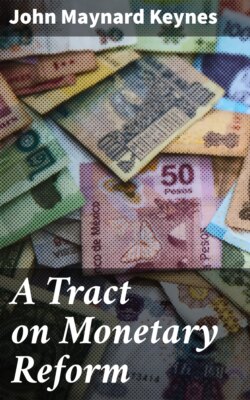Читать книгу A Tract on Monetary Reform - John Maynard Keynes - Страница 9
На сайте Литреса книга снята с продажи.
Оглавление* * * * *
We conclude that Inflation redistributes wealth in a manner very injurious to the investor, very beneficial to the business man, and probably, in modern industrial conditions, beneficial on the whole to the earner. Its most striking consequence is its injustice to those who in good faith have committed their savings to titles to money rather than to things. But injustice on such a scale has further consequences. The above discussion suggests that the diminution in the production of wealth which has taken place in Europe since the war has been, to a certain extent, at the expense, not of the consumption of any class, but of the accumulation of capital. Moreover, Inflation has not only diminished the capacity of the investing class to save but has destroyed the atmosphere of confidence which is a condition of the willingness to save. Yet a growing population requires, for the maintenance of the same standard of life, a proportionate growth of capital. In Great Britain for many years to come, regardless of what the birth-rate may be from now onwards (and at the present time the number of births per day is nearly double the number of deaths), upwards of 250,000 new labourers will enter the labour market annually in excess of those going out of it. To maintain this growing body of labour at the same standard of life as before, we require not merely growing markets but a growing capital equipment. In order to keep our standards from deterioration, the national capital must grow as fast as the national labour supply, which means new savings of at least £250,000,0007 per annum at present. The favourable conditions for saving which existed in the nineteenth century, even though we smile at them, provided a proportionate growth between capital and population. The disturbance of the pre-existing balance between classes, which in its origins is largely traceable to the changes in the value of money, may have destroyed these favourable conditions.
7That is to say, it costs not less than £1000 in new capital outlay to equip a working man with organisation and appliances, which will render his labour efficient, and to house and supply himself and his family. Indeed this is probably an underestimate.
On the other hand Deflation, as we shall see in the second section of the next chapter, is liable, in these days of huge national debts expressed in legal-tender money, to overturn the balance so far the other way in the interests of the rentier, that the burden of taxation becomes intolerable on the productive classes of the community.
